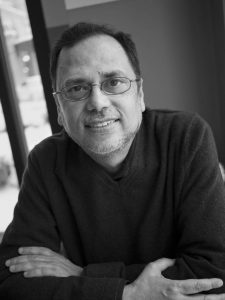Leanne Betasamosake Simpson is a renowned Michi Saagiig Nishnaabeg scholar, writer and artist, who has been widely recognized as one of the most compelling Indigenous voices of her generation. Her work breaks open the intersections between politics, story and song—bringing audiences into a rich and layered world of sound, light, and sovereign creativity.
Working for over a decade an independent scholar using Nishnaabeg intellectual practices, Leanne has lectured and taught extensively at universities across Canada and has twenty years experience with Indigenous land based education. She holds a PhD from the University of Manitoba, is currently a Distinguished Visiting Scholar in the Faculty of Arts at Ryerson University and faculty at the Dechinta Centre for Research & Learning in Denendeh. Leanne’s books are regularly used in courses across Canada and the United States including Dancing on Our Turtle’s Back, The Gift Is in the Making, Lighting the Eighth Fire (editor), This Is An Honour Song (editor with Kiera Ladner) and The Winter We Danced (Kino-nda-niimi editorial collective). Her latest book, As We Have Always Done: Indigenous Freedom Through Radical Resistance was published by the University of Minnesota Press in the fall of 2017, and was awarded Best Subsequent Book by the Native American and Indigenous Studies Association.
Introduction from Duke Divinity Professor Norman Wirzba
Followed by a conversation with Duke Professor of Anthropology Christine Folch and audience Q&A
Lecture: 5-7pm – Nelson Music Room
Reception: 7-7:45pm – Blue Parlor
Free parking available Carr and Gilbert-Addoms, with ADA parking outside of East Duke
Sponsored by the Henry Luce Foundation (part of the Luce Anthropocene lecture series)

 Dr. Chakrabarty is known for his work on modern South Asian history and historiography; subaltern, indigenous, and minority histories; decolonization; and environmental history and the implications of climate change for human history. His most recent books are The Crises of Civilization: Exploring Global and Planetary Histories (Delhi: Oxford, forthcoming 2018) and, with Ranajit Dasgupta, Some Aspects of Labour History of Bengal in the Nineteenth Century: Two Views (Delhi: Oxford, 2018). He is also the coeditor, along with Henning Trüper and Sanjay Subrahmanyam, of Historical Teleologies in the Modern World (Bloomsbury, 2015). He is currently working on three books, provisionally titled The Planet and the Human: The Anthropocene as Present (Chicago), The Historical Imagination and Its Contemporary Crisis (Duke), and The Holocene Lost? Provincializing Europe in a Warming World (University Press of New England), which he delivered as the the Mandel Lectures in the Humanities at Brandeis University in March 2017.
Dr. Chakrabarty is known for his work on modern South Asian history and historiography; subaltern, indigenous, and minority histories; decolonization; and environmental history and the implications of climate change for human history. His most recent books are The Crises of Civilization: Exploring Global and Planetary Histories (Delhi: Oxford, forthcoming 2018) and, with Ranajit Dasgupta, Some Aspects of Labour History of Bengal in the Nineteenth Century: Two Views (Delhi: Oxford, 2018). He is also the coeditor, along with Henning Trüper and Sanjay Subrahmanyam, of Historical Teleologies in the Modern World (Bloomsbury, 2015). He is currently working on three books, provisionally titled The Planet and the Human: The Anthropocene as Present (Chicago), The Historical Imagination and Its Contemporary Crisis (Duke), and The Holocene Lost? Provincializing Europe in a Warming World (University Press of New England), which he delivered as the the Mandel Lectures in the Humanities at Brandeis University in March 2017.